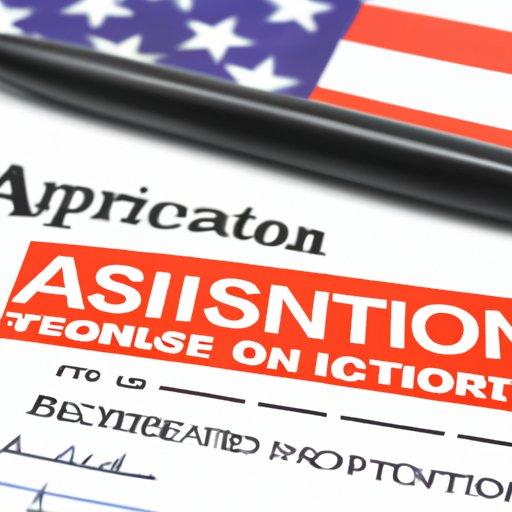Introduction
Are you authorized to work in the United States? If not, what options do you have to become an authorized worker? Understanding the process of becoming an authorized worker in the United States is essential for anyone looking to work in the country. In this article, we will explore the definition of “authorized to work in the United States,” the benefits and process of obtaining authorization, understanding your rights as an authorized worker, exploring immigration options for working in the United States, and the potential impact of unauthorized workers on the U.S. economy.

Definition of “Authorized to Work in the United States”
According to U.S. Citizenship and Immigration Services (USCIS), “authorized to work in the United States” means that a person has permission from the U.S. government to accept employment in the country. This includes individuals who are citizens, permanent residents, refugees, asylees, and those with valid visas or other forms of legal authorization. Individuals who are not authorized to work in the United States include those who overstayed their visas or entered the country without proper documentation.
Benefits of Being Authorized to Work in the United States
Being authorized to work in the United States can provide many benefits, including access to job opportunities, security and protection of rights, and financial stability.
Access to Job Opportunities
One of the primary benefits of being authorized to work in the United States is access to job opportunities. According to the Bureau of Labor Statistics, there were more than 7.4 million unemployed people in the United States in 2019. Having authorization to work in the United States can help individuals gain access to these job opportunities and increase their chances of finding employment.
Security and Protection of Rights
Another benefit of being authorized to work in the United States is the security and protection of rights that comes with it. Authorized workers are eligible for certain protections under the law, such as the right to receive minimum wage and overtime pay, the right to form unions, and the right to be free from discrimination.
Financial Stability
Finally, being authorized to work in the United States can provide financial stability. Working legally in the United States can help individuals support themselves and their families financially and gain access to resources such as health care and retirement plans.

Obtaining Authorization to Work in the United States
In order to obtain authorization to work in the United States, individuals must meet certain eligibility requirements and follow the process for applying for authorization.
Eligibility Requirements
The first step in obtaining authorization to work in the United States is to determine whether or not you are eligible. To be eligible for authorization, you must be a citizen, permanent resident, refugee, asylee, or have a valid visa or other form of legal authorization. Additionally, you must be at least 18 years old and able to prove your identity and employment eligibility.
Process for Applying for Authorization
Once you have determined that you are eligible for authorization to work in the United States, you must then complete the application process. This process typically involves completing an Employment Eligibility Verification Form (Form I-9) and providing documents that prove your identity and employment authorization. Once the application is completed and approved, you will be officially authorized to work in the United States.
Understanding Your Rights as an Authorized Worker
As an authorized worker in the United States, you have certain rights and benefits under the law. It is important to understand these rights so that you can protect yourself and ensure you are treated fairly.
Benefits Under the Law
As an authorized worker in the United States, you are eligible for certain benefits under the law, including the right to receive minimum wage and overtime pay, the right to form unions, and the right to be free from discrimination.
Protections From Discrimination
As an authorized worker in the United States, you are also protected from discrimination based on race, color, religion, sex, national origin, age, disability, or genetic information. The Equal Employment Opportunity Commission (EEOC) enforces laws that prohibit workplace discrimination, and employers must comply with these laws when hiring and managing employees.

Exploring Immigration Options for Working in the United States
Individuals who are interested in working in the United States but are not authorized to do so may be able to explore immigration options. These options include temporary work visas and permanent residency.
Temporary Work Visas
Temporary work visas allow individuals to enter the United States for a limited period of time for the purpose of working. These visas are typically issued for specific jobs and are available to individuals who meet certain eligibility requirements. Examples of temporary work visas include H-1B visas for skilled workers, H-2A visas for agricultural workers, and L-1 visas for foreign executives.
Permanent Residency
Permanent residency allows individuals to live and work in the United States indefinitely. To become a permanent resident, individuals must meet certain eligibility requirements and go through the process of applying for a green card. Once the application is approved, individuals can receive their green card and become a permanent resident of the United States.
The Impact of Unauthorized Workers on the U.S. Economy
Unauthorized workers can have a significant impact on the U.S. economy. This impact can include lower wages, weakened labor laws, and decreased contributions to social security.
Impact on Wages
Research has shown that unauthorized workers are often paid lower wages than authorized workers, which can lead to lower wages overall in the U.S. economy. A 2017 study by the National Academies of Sciences, Engineering, and Medicine found that undocumented immigrants in the United States earned an average of 8 percent less than similarly qualified authorized workers.
Impact on Labor Laws
Unauthorized workers are often unable to access the protections and benefits afforded to authorized workers under labor laws. This can weaken labor laws and make it easier for employers to exploit workers.
Impact on Social Security
Finally, unauthorized workers are not eligible to contribute to social security, which can lead to decreased contributions to the system and a lack of funds for those who are eligible. A 2013 study by the Social Security Administration estimated that unauthorized workers contributed $13 billion to the system in 2010.
Conclusion
Being authorized to work in the United States can offer many benefits, including access to job opportunities, security and protection of rights, and financial stability. Obtaining authorization involves meeting certain eligibility requirements and following the process for applying for authorization. It is important to understand your rights as an authorized worker in order to protect yourself and ensure you are treated fairly. Additionally, unauthorized workers can have a significant impact on the U.S. economy, including lower wages, weakened labor laws, and decreased contributions to social security. Understanding the process of becoming an authorized worker in the United States is essential for anyone looking to work in the country.
(Note: Is this article not meeting your expectations? Do you have knowledge or insights to share? Unlock new opportunities and expand your reach by joining our authors team. Click Registration to join us and share your expertise with our readers.)
